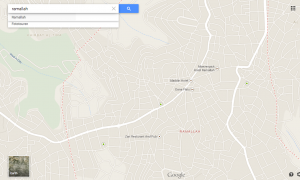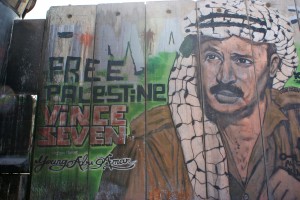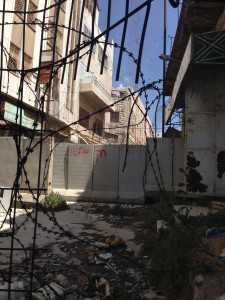Archive for category Lukas Matzkows
Leaving…
Posted by Lukas Matzkows in Lukas Matzkows, West Bank on July 13, 2014
It has been a while since my last post. To be honest, my mind was preoccupied with other things lately. Now I am back in Germany and feel I should share my experiences of the last weeks in Jerusalem. I suppose that many of the people reading this blog also follow the news on our particular place in the world. Over the last weeks, the atmosphere in Jerusalem has changed significantly due to recent events. I will not even attempt to give a thorough summary of everything that happened, but I would still like to share some facts. On June 12th, three Israeli teenagers were kidnapped while hitchhiking in the occupied Palestinian territories, allegedly by Hamas (who have not taken responsibility for it). Israelis authorities then started a large scale police and military operation in the West Bank, searching for these teens. Over the next two weeks 350 Palestinians were arrested, dozens of houses demolished and five Palestinians killed in clashes between the IDF and protestors.
When the bodies of the three teenagers were found north of Hebron on June 30th, violence also spread to Jerusalem, when mobs of right wing Israelis roamed the streets looking for Arab workers. We coincided to walk past a rally, claiming “Kahane was right” and chanting “an Arab is a son of a bitch”. One of the places that was attacked, was the restaurant of our landlord for giving shelter to a Palestinian boy. On Facebook and other social media, campaigns started calling for revenge against the Palestinian people under #IsraelDemandsRevenge.
Two days later, the next despicable act followed, three Israelis kidnapped a 15-year-old Palestinian boy from the East-Jerusalem neighborhood of the Shuafat refugee camp, burned him alive and killed him in the woods outside the city. This act led to large scale protests in Shuafat, the West Bank and other parts of East Jerusalem. For more than two weeks now, parts of Israel and Palestine are burning every night. Every night we hear the sirens and the helicopters outside our apartment window, while Israel is preparing/carrying out the operation “Protective Edge”, which seems to aim at complete annihilation of Hamas in the Gaza Strip. By now, more than 120 Palestinians in Gaza have been killed and thousands injured.
The past events have made me question the use of the profession I chose. The indiscriminate hate for people based on their race I have seen in the faces of people makes me wonder whether there is any point in trying to find a just and peaceful solution. We came here five weeks ago, to document water issues in the West Bank and were given a first hand glimpse of the nature of the conflict. Our project here is over. People have other things to do than talking to us and the West Bank is not safe for us at the moment. On last Sunday we made the decision to leave the country, since it was completely unclear where this conflict is heading and we felt more and more useless, forced to sit at home and restricting ourselves to watching and reading the news. Personally it is a big disappointment. Ally and I were struggling a lot getting in contact with individuals willing to share their stories and now that we finally started to make some progress our contacts are being cut off. While I do not feel I was in danger, my family and friends were getting worried and urged me to come home. This also showed me how different the perceptions can be on the ground and far away only through the media. On Tuesday the first rockets hit Jerusalem and I for the first time in my life heard sirens telling me to look for shelter. However, everyone in the restaurant looked a little bit startled, but did not make any attempt to go anywhere and after a few minutes it was all over and people returned to business as usual. I guess people growing up and living in an environment of more or less constant conflict, experience these kind of things in a different way than us ‘outsiders’.
I left Jerusalem on Thursday with a bad feeling in my stomach. It is a feeling of giving up and leaving people behind. I knew when I came here, that I would not solve the conflict, yet the feeling stays. I am trying to tell myself that there was nothing I could have done and that leaving was the right decision, especially on hindsight.
For me, these events mean the end of my research project, for the people that stay there, it means a lot more.
First field trip on the schedule
Posted by Lukas Matzkows in Lukas Matzkows, West Bank on June 27, 2014
As Ally said in her last entry we have been struggling to get in touch with people on the ground for the last weeks. Coming to country with only a handful of personal contacts and a culture so different from the one at home proved to be quite a challenge, but also a learning experience for us. However, the last few days make us feel more optimistic about the upcoming second half of our fellowship.
On Monday we met with a German hydrologist, recommended by one of my professors, who has been living in Ramallah since 1997 and is well connected in the field. Finding his office was a task of his own and what Janine said about Yangon is certainly also true for the West Bank. People give you the name of a street and you think, I will just type that into Google Maps. Well, think again, Google Maps has almost no street names in Ramallah and finding an address by yourself is nearly impossible.
After he gave us a detailed description and drew a map for us we managed to find him and he was happy to help. He established connections for us to the people of the Jordan Valley Solidarity Campaign (http://jordanvalleysolidarity.org/), who we will visit on Monday in the small community of Fasayel, north of Jericho. In this particular area, water should be available in abundance, yet it is one of the regions suffering the most from limited supply. According to a survey of Save the Children UK, only 37% of the inhabitants have regular access to water resources
(http://www.savethechildren.org.uk/sites/default/files/docs/English_Jordan_Valley_Fact_Sheet_and_Citations.pdf).
It will be our first proper visit to the field and Ally and I are very excited, but also anxious about meeting people directly affected by water restrictions and shortages.
As Ally announced yesterday, in addition to the contacts established, we chose to have a change of strategy, away from e-mailing dozens of organisations that do not answer, towards a more direct approach of simply walking into their offices. We tried that strategy yesterday in Ramallah. and were not very successful. Of the two organisations we tried to meet, one said they cannot help us and at the other one nobody was there. Luckily, when we were about to leave Ramallah disappointed, Palestine showed itself to us from its best side again, in the form of its people. Ally and I decided to walk to the checkpoint, because we were more or less in between Qalandiya and the bus station and all busses that passed by were too full to take us. After walking for a while we heard constant honking behind us and saw a man in his lorry waving at us. His name was Hatem and he insisted to take us to the checkpoint. Although he hardly spoke any English and a conversation with our rudimentary Arabic was not really possible, we learned some things about him, exchanged phone numbers and saw again how kind and warm hearted the people of this country are.
A visit to the Shuk
Posted by Lukas Matzkows in Lukas Matzkows, West Bank on June 18, 2014
With tensions still tangible in many parts of the West Bank, Ally and I spent the last few days in Jerusalem. After visiting a former prison, yesterday, we decided to do something more joyful today and finally paid our first visit to the local Shuk we had heard so much about. The Shuk or Sooq often is the commercial center of North African and Middle Eastern cities, here in Jerusalem it is the central market. The Mahane Yehuda Shuk near the new city center around Jaffa and Ben Yehuda Street has existed in various forms for more than a hundred years and is a place to shop for both Jerusalemites and tourists. It is a world of its own, consisting of a number of small streets and alleyways packed wit people and delicacies.
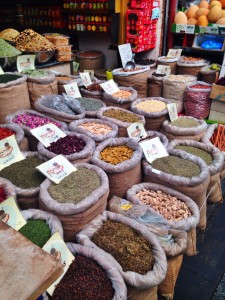
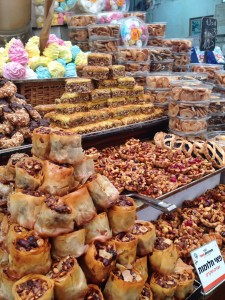
When we entered the roofed street of the market, we entered a beautiful place full of colors, smells and flavors. The market was full of people pushing through the narrow streets and we were overwhelmed by the variety of things on display. The smell of spices mixes with tea and fresh fruits and vegetables, while the ‘Halva King’ praises his latest creation. We wandered around the market for a couple of hours, only to take in the special atmosphere and in the end went home with some potatoes, fresh mint and lemons. There was just too much to chose from and we were not able to pick anything else from all these hundreds of stalls. Next time, that will be different.
The divided city of Hebron
Posted by Lukas Matzkows in Lukas Matzkows, West Bank on June 12, 2014
The last week was incredibly busy and so full of unforgettable impressions that I struggle with structuring all the thoughts in my head and write them down. One of the many places we visited, was the city of Hebron. It is one of Palestine’s biggest cities, located in the south of the West Bank. It is a city with a beautiful old city center, a once busy market and it is home to the tombs of Abraham, Sara and Isaac, which makes it a holy place for all of three religions in this country. It is also a city of division and conflict. Since 1979 religious jews have settled in and around the city and today the old town is home to around 30.000 Palestinians and 800 settlers. The city is divided in the areas H1, under Palestinian control, and H2, under full control of Israeli authorities.
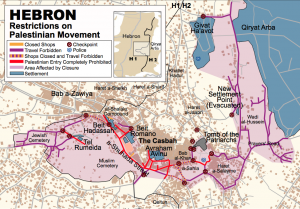
(https://www.btselem.org/download/200705_hebron_center_map_eng.pdf)
We entered the city with our guide Usama, from the Palestinian Conflict Transformation Center Wi’Am(which is Arabic for cordial relationships), who had a few heartbreaking stories to tell about his family and the ramifications of the ongoing conflict. He led us to the main street where at the first glimpse you would think it is a normal busy oriental city, but when you look up you notice something is different. The whole market area has an overhead fence which is bending down from the weight of litter. It has been set up by TIPH, an international observer mission that first came to Hebron following a massacre at the local mosque that left 29 male worshippers dead and 125 wounded. The fence protects the market from settlers who live on the second floor and through things at people and goods on display.
After that impression we visited the house of a friend of Usama. He lives almost wall on wall with settlers in Beit Hadassah. From his roof you can see Shuhada-Street, once a vibrant street where jewelers sold their goods. Today, the street is under full control of the settlers and Palestinians are not allowed to set foot in it anymore. Parts of it are completely shut down, in the rest, access is limited to Israelis. Shopkeepers that had their businesses here for generations had to abandon their shops and houses which led to an increase of unemployment and poverty. According to the UN, 75% of Palestinian residents of the old Souk area live under the poverty line. Usama’s friend told us stories and showed us videos of settlers climbing onto his roof to take down the Palestinian flag while soldiers stand by and watch. Standing on this roof, we could feel the tension that is all time present in this city and I was somewhat relieved once when we climbed down.
Our next stop, after crossing two more security checkpoints, was the beautiful Ibrahimi Mosque that has its own history. Following the events of 1994, the mosque was, as the city, divided. 40% remained a mosque, while 60% became a synagogue. Access to the mosque is completely controlled by the Israeli army, and completely restricted on jewish holidays. Inside we found stunning mosaics, paintings and the memorials of Abraham and Sara.
After that, we left the city the way we came, under the protection of the fence above.
First Steps into the West Bank
Posted by Lukas Matzkows in Lukas Matzkows, West Bank on June 3, 2014
Day three of our Israel/Palestine adventure started more or less like day two ended, we got lost. Somehow this appears to become a reoccurring thing here in Jerusalem. This time it was on the search for a supermarket. After some walking around and backtracking we managed to find a little place to buy Pita and Hummus. With these provisions for the road, we embarked bus 19 leaving near Damascus Gate for Ramallah.
We had both seen the wall and the checkpoints before, but nonetheless they remain an intimidating sight. We crossed the checkpoint without any trouble and saw the West Bank for the first time. Ramallah is a very busy and hectic town, where everything is a little more chaotic and disorganized in the best way possible. Cars are driving going through roundabouts in the opposite direction, you hear constant honking and at the same time everyone is so willing to help these two westerners that have no idea how to get from A to B.
Once there, we went to the Heinrich-Böll-Foundation, a group affiliated with the Green Party in Germany, which was hosting an open day, celebrating their office’s 15th anniversary. Great people, that made us feel very welcome and promised to help in the future should we need anything.
The way back to Jerusalem took a little longer than expected, because we naively decided to go during the rush hour. Apart from that everything went smoothly and the Israeli soldiers with their big guns only looked at our passports for two seconds.
I have to admit, that the climate is taking its toll. It is only 7pm and I feel exhausted from only walking around a couple of hours. I guess I will need a few more days to adjust to this.
Preparing for the West Bank
Posted by Lukas Matzkows in Lukas Matzkows, West Bank on May 26, 2014
مرحبا / שלום
My plane taking me to Tel Aviv, where I will meet my fellow peacebuilder Ally for the first time and from where we will continue to Jerusalem is now not even six days away. The past weeks of preparation have been stressful and uncertain whether we would be allowed to go through with the project. However, thanks to a lot of work and convincing by our organizer Pushpa everything got sorted out and as the day of departure gets closer and closer the excitement rises. I have visited the region for the first and last time three years ago and have always wanted to go back.
Ally and I have spent quite some time on finding a place to stay, which proved to be difficult in a city like Jerusalem in summer time. Luckily a friend living there could put us in contact with someone subletting a place and now we have our little flat right in the city centre. I am looking forward to seeing and experiencing the city and the culture of the region from a perspective other than the tourist one and my friend in Jerusalem already promised to show us the ‘real’ Jerusalem.
Right now, I am sitting in my room and outside my window it is raining heavily. The temperature is at 12°C/53.6°F while the weather forecast for Jerusalem on sunday predicts up to 36°C/96.8°F. I guess adapting to the different climate is also going to be a challenge…
Apart from soaking in the culture, I cannot wait to start working. We have contacted friends, colleagues and NGOs we will meet and that tell us their stories or help us finding people that will. Water is a fundamental human right, necessary to live a life in dignity. Telling the stories of people that had this right taken from them will be a big task, but I am determined to make their voices heard.
For my last days in Germany I am planning to spend as much time with my family, my girlfriend and my friends as I can. Sure, it is not the first time I leave, but this time appears to be the most exciting journey yet.
Twitter @lukasCCS
